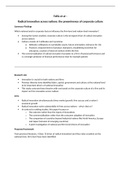-
1. Samenvatting - (e+a) tripsas, m., & gavetti, g. (2000). capabilities, cognition, and inertia: eviden...
-
2. Samenvatting - Gibson, c. b., & birkinshaw, j. (2004). the antecedents, consequences, and mediating ...
-
3. Samenvatting - O’connor, g. c. (2008). major innovation as a dynamic capability: a systems approac...
-
4. Samenvatting - Tripsas, m., & gavetti, g. (2000). capabilities, cognition, and inertia: evidence fro...
-
5. Samenvatting - Burgers, j. h., & covin, j. g. (2016). the contingent effects of differentiation and ...
-
6. Samenvatting - Jansen, j. j. p., tempelaar, m. p., van den bosch, f. a. j., & volberda, h. w. (2009)...
-
7. Samenvatting - O’connor, g. c., & demartino, r. (2006). organizing for radical innovation: an expl...
-
8. Samenvatting - O’reilly, c. a., & tushman, m. l. (2013). organizational ambidexterity: past, prese...
-
9. Samenvatting - Helfat, c. e., & peteraf, m. a. (2015). managerial cognitive capabilities and the mic...
-
10. Samenvatting - Hodgkinson, g. p., & healey, m. p. (2011). psychological foundations of dynamic capab...
-
11. Samenvatting - Kammerlander, n., könig, a., & richards, m. (2018). why do incumbents respond hetero...
-
12. Samenvatting - Maula, m. v. j., keil, t., & zahra, s. a. (2012). top management’s attention to dis...
-
13. Samenvatting - Raffaeilli, r. l., glynn, m. a., & tushman, m. 2018. flexing the frame: tmt framing a...
-
14. Samenvatting - Schilling, m. a. 2017. serial breakthrough innovation: the roles of separateness, sel...
-
15. Samenvatting - Smith, w. k., & tushman, m. l. (2005). managing strategic contradictions: a top manag...
-
16. Samenvatting - O’connor, g. c., corbett, a., & pierantozzi, r. (2009). create three distinct caree...
-
17. Samenvatting - Tellis, g. j., prabhu, j. c., & chandy, r. k. (2009). radical innovation across natio...
-
18. Samenvatting - Keil, t., mcgrath, r. g., & tukiainen, t. (2009). gems from the ashes: capability cre...
-
19. Samenvatting - Khanna, r., guler, i., & nerkar, a. (2016). fail often, fail big, and fail fast? lear...
-
20. Samenvatting - Lange, d., boivie, s., & henderson, a. d. (2009). the parenting paradox: how multibus...
-
21. Samenvatting - Raisch, s., & tushman, m. l. (2016). growing new corporate businesses: from initiatio...
-
Meer zien





